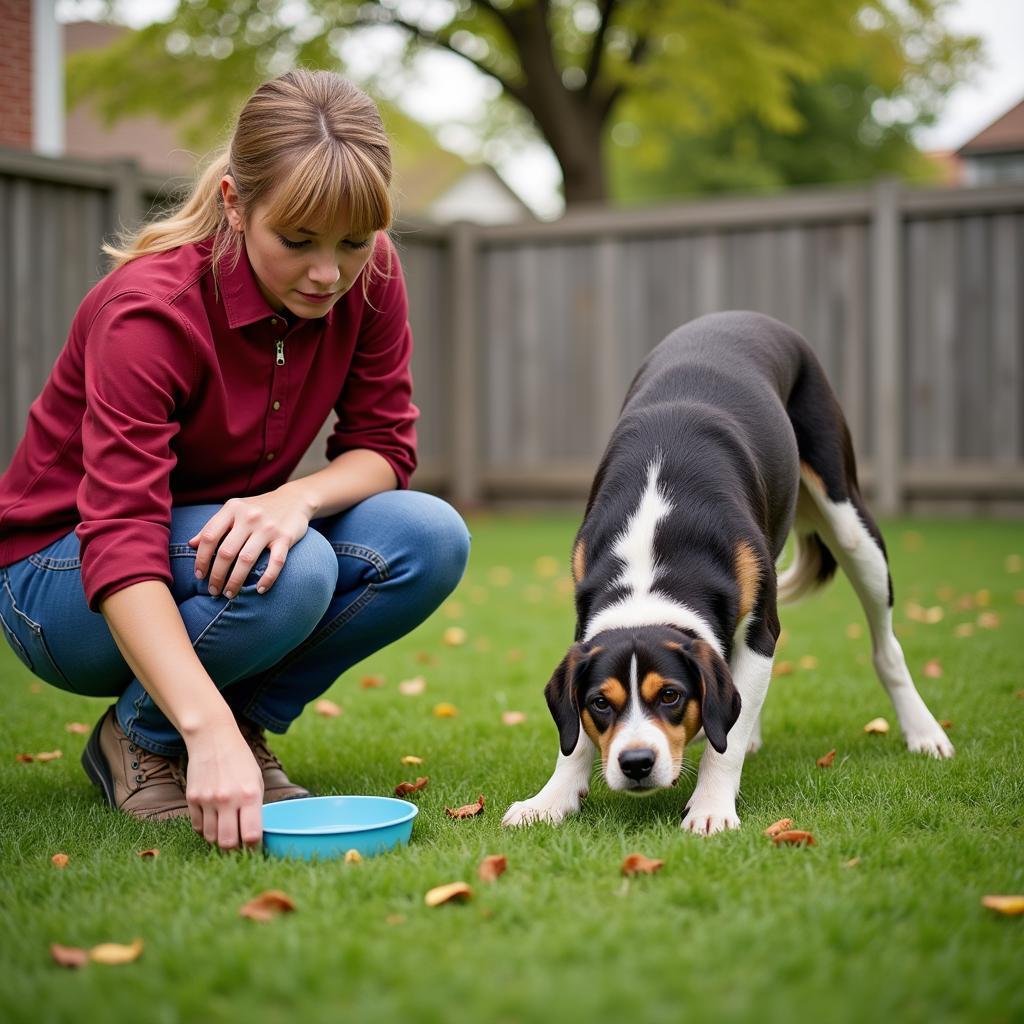You rush home from work, eager to greet your furry friend, only to be met with a puddle of partially digested kibble. And here’s the kicker: your dog ate hours ago! It’s normal to feel a wave of panic. Seeing your dog vomit undigested food, especially hours after eating, can be alarming. But don’t worry, this article is here to guide you through the potential reasons and what steps you should take.
Understanding Why Your Dog Vomits Undigested Food Hours Later
Before we jump into the specifics, it’s important to distinguish between vomiting and regurgitation. Vomiting is a forceful expulsion of stomach contents, often accompanied by retching or heaving. Regurgitation, on the other hand, is a more passive process, where undigested food comes back up from the esophagus, often looking like a tube-shaped mass.
When your dog vomits undigested food hours after a meal, it suggests a delay in gastric emptying, meaning the food is staying in the stomach longer than it should. There are several reasons why this might happen:
-
Dietary Indiscretion: Did your pup get into the trash, gobble down table scraps, or snack on something they shouldn’t have? Eating inappropriate items can upset their stomach and lead to vomiting.
-
Food Sensitivity or Allergy: Just like humans, dogs can develop sensitivities or allergies to certain ingredients in their food. Common culprits include beef, chicken, dairy, and wheat.
-
Parasites: Intestinal parasites, such as roundworms or hookworms, can interfere with digestion and cause vomiting.
-
Inflammatory Bowel Disease (IBD): IBD is a chronic condition that causes inflammation in the digestive tract, making it difficult for food to move through properly.
-
Gastric Motility Disorders: These are conditions that affect the muscles in the stomach, slowing down or disrupting the normal process of digestion.
 Dog Vomiting Outside
Dog Vomiting Outside
When is it Time to Worry?
While an occasional episode of vomiting might not be a cause for major concern, there are some red flags that warrant a trip to the veterinarian:
- Frequent Vomiting: If your dog vomits multiple times a day or for more than 24 hours, it’s crucial to seek veterinary attention.
- Blood in Vomit: The presence of blood, whether it’s bright red or looks like coffee grounds, requires immediate veterinary care.
- Lethargy and Weakness: If your dog seems excessively tired, weak, or unresponsive, it could indicate a more serious underlying condition.
- Loss of Appetite: A sudden disinterest in food, especially if accompanied by other symptoms, is a warning sign.
- Diarrhea: If vomiting is accompanied by diarrhea, it could suggest gastroenteritis or another intestinal issue.
Diagnosing the Cause of Vomiting
To determine the underlying cause of your dog’s vomiting, your veterinarian will likely recommend a combination of the following:
- Physical Examination: A thorough physical exam will help assess your dog’s overall health and check for any abnormalities.
- Blood Tests: Blood work can reveal signs of infection, inflammation, or organ dysfunction.
- Fecal Exam: This test checks for the presence of intestinal parasites.
- X-rays or Ultrasound: Imaging tests can help visualize the digestive tract and identify any blockages or abnormalities.
- Endoscopy: In some cases, an endoscopy, a procedure that uses a flexible tube with a camera, may be necessary to examine the lining of the esophagus, stomach, and duodenum.
What to Do If Your Dog is Vomiting
If your dog vomits undigested food hours after eating, the first thing to do is to remove their food and water for a few hours to allow their stomach to settle. Once the vomiting subsides, you can offer them small amounts of bland food, such as boiled chicken and rice.
Tips to Prevent Future Episodes
While you can’t prevent every instance of vomiting, there are steps you can take to minimize the risk:
- Feed High-Quality Food: Choose a high-quality, easily digestible dog food that’s appropriate for their age, breed, and size.
- Establish Regular Feeding Schedule: Feed your dog at the same time each day to establish a routine.
- Slow Down Fast Eaters: If your dog tends to gulp down their food, consider using a slow-feed bowl or puzzle feeder.
- Secure the Trash: Keep garbage cans securely covered and store food out of reach to prevent scavenging.
- Regular Vet Checkups: Schedule regular wellness checkups with your veterinarian to detect and address any potential health issues early on.
Dog Keeps Throwing Up Undigested Food?
If you find yourself frequently dealing with your dog throwing up undigested food, you’re not alone. This is a common concern among pet parents. For a deeper dive into this specific issue, check out our comprehensive article on dog keeps throwing up undigested food.
Your Dog’s Health is Our Priority
At Mina Cones Food, we’re committed to providing you with the information you need to keep your canine companions happy and healthy. Remember, this article is intended for informational purposes only and shouldn’t be considered a substitute for professional veterinary advice.
If you have any concerns about your dog’s health, please don’t hesitate to contact our team at 02437655121 or email us at minacones@gmail.com. You can also visit us at our clinic located at 3PGH+8R9, ĐT70A, thôn Trung, Bắc Từ Liêm, Hà Nội, Việt Nam. We’re here to support you 24/7.